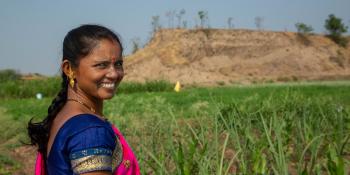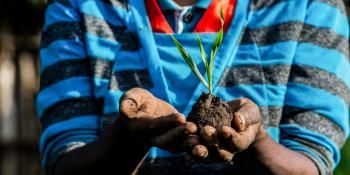Sustainable climate services? Think contract farming, youth employment, phygitalization of agriculture
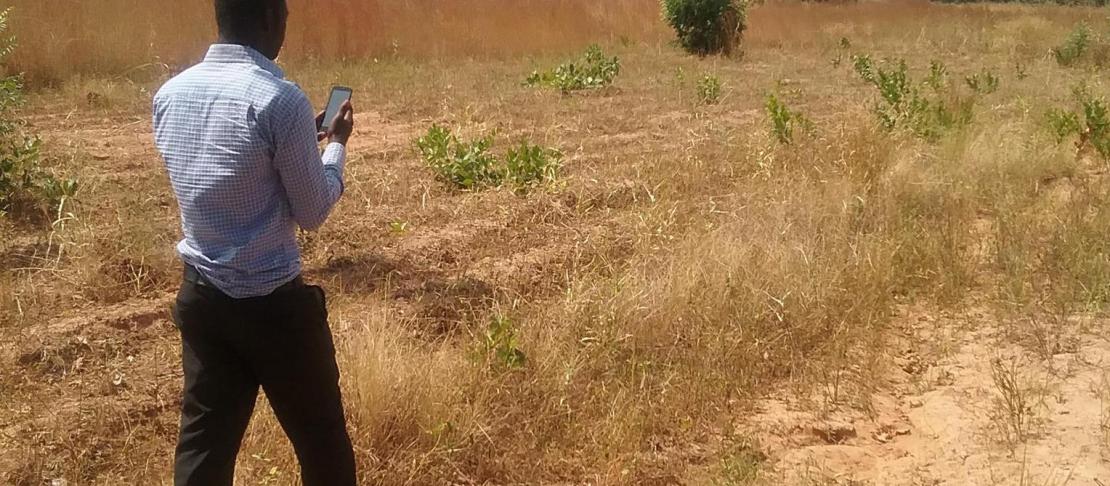
In 2016, 6,000 smallholder producers from Ghana’s Northern Region assessed their farm enterprise’s exposure to climate risk under the Participatory Integrated Climate Services for Agriculture initiative.
Many smallholder producers expressed interest in improved response farming, such as altered sowing and fertilization tactics. 97% of them declared changed practices as a result of the Particpatory Integrated Climate Services for Agriculture (PICSA) interactions. Several others indicated a propensity for more ambitious shifts, such as increased investment in soybean cultivation as an alternative risk management strategy.
The assessment took place under the PICSA initiative carried out by ADRA, the African Institute for Mathematical Sciences (AIMS) and Oxfam.
Meanwhile, 2,000 km further west in Dakar, the project Capacitating African Smallholders with Climate Advisories and Insurance Development (CASCAID) partners were weighing options to intelligently reduce the fragmentation of research on climate services in a context of declining public funds. CASCAID, a CCAFS implemented project, concurrently with PICSA, holds activities on improved yield forecasting, index insurance, advisory dissemination through IT platforms and rural radios, capacitation of national meteorological services, Enhancing National Climate Services initiative (ENACTS), the CCAFS Regional Agricultural Forecasting Tool (CRAFT), assimilation of Earth Observation data, and more in Burkina Faso, Ghana, Mali, and Senegal.
These two seemingly unrelated developments converged dramatically in November 2017 with the pilot enrollment of thousands of Ghanaian soybean and sorghum farms into agCelerantTM, the phygital value chain orchestration platform deployed by MANOBI to safely connect smallholder producers to agro-industrial processors, service industries, and distant consumer markets. Farmers’ endorsement of soybean, a promising cash crop of dubious superiority for climate risk management nonetheless bears testimony to PICSA’s holistic advantage, which captured farmers’ opportunistic preference for enhanced income in a dynamic context where only one-third of the 150,000+ Mt national demand for soybean is sourced in-country.
Facilitated by specialists from the International Crops Reseach Institute for the Semi-Arid Tropics (ICRISAT), the Savanna Agricultural Research Institute (SARI) and University of Ghana who trained 18 aspiring agCelerantTM franchisees in the use of fit-for-purpose apps, this incorporation assembled unique, detailed information on umbrella organizations, farmer cooperatives, village contexts, farmer identification and livelihoods, agricultural assets, plot boundaries, management practices, and production infrastructure. After the initial training held in Tamale and neighboring Kpalsugu between 15 and 18 November, selected investigators fanned out to Northern Region’s Kumbungu, Mion, Savelugu, and Tolon districts and to Upper East Region’s Garu-Tempane district to complete the farmers’ enrollment and baseline data collection in a blazing 10 days. Strenuous emphasis was put on data quality, such as accurate plot delineation, which was strictly controlled in near-real time from back-office supervisors in Tamale and Dakar; each investigator’s compensation was performance-based, generating visible enthusiasm in the highest achievers, emulation in the others, and setting an example of how franchised extension services of the future will operate.
Developing inclusive value chains
AgCelerantTM data streams on household livelihoods, plot-level agronomic practices, and recorded yields will not only leverage University of Ghana’s efforts to quantify the climate sensitivity of soybean (missing until now a locally calibrated growth model); they will also catalyze the development of inclusive value chains without which economically viable, self-sustaining smallholder climate services are virtually impossible to establish. Embracing a 360-degree view of the reality of smallholder agricultural production, such service ecosystems cater simultaneously to the needs of farmers and of other value chain stakeholders, for which access to climate information is but one requirement among many. Their more holistic nature allows the distribution of service charges and profits between multiple actors thereby decreasing the unitary cost of individual products.
We need to know more about the situation of growers, their socio-economic conditions, their land, their access to credit, their use of inputs."
"We need to know more about the situation of growers, their socio-economic conditions, their land, their access to credit, their use of inputs. Without this information it is impossible to organize robust, inclusive value chains in which the cost of climate and other services can be absorbed by the business operations, in lieu of bottom-of-the-pyramid producers," explained Dr. Daniel Annerose, MANOBI’s Chief Executive Officer when introducing the initiative to University of Ghana, the Ghana Agricultural Insurance Program (GAIP) and other national CASCAID partners in Accra on 13 and 14 November. He elaborated further: "today, the phygital combination of mobile platforms, Earth Observation, IoT technologies with locally sourced, human expertise makes it possible to decouple uncontrollable risk (e.g. arising from climatic uncertainty) from suboptimal agronomic practices in ways never before possible. In insurance, for example, this not only allows significant reduction in basis risk and moral hazard, it also makes smallholder indemnity insurance a reality in the short term… with side bonuses called youth employment and emulation of good transactional practice. We know how to accelerate this transition."
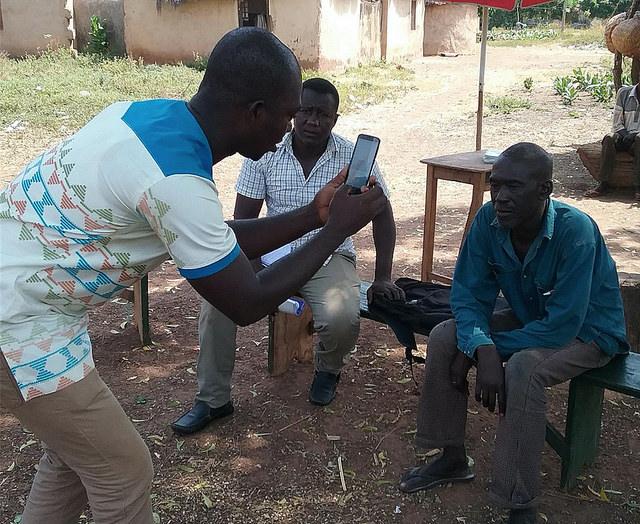
AgCelerantTM investigator Mr. M. Wumbei taking the picture of a farmer during enrollment. Photo: A.Nenkam (ICRISAT)
Use of agCelerantTM is being explored with DIAGEO’s Guinness Ghana Breweries Ltd. to improve the operational efficiency of its sorghum supply chains, an important goal for this processor aiming to substitute a significant fraction of its barley imports with an estimated annual 25,000 Mt sorghum input. Already used by Senegal’s CNAAS and its authorized agents to manage its portfolio of agricultural insurance products, agCelerantTM also offers an opportunity to rapidly digitalize GAIP’s own operations, currently managed offline using spreadsheet software. The Ghana Meteorological Agency is yet another potential beneficiary of this phygital services ecosystem, for the dissemination of climate advisories generated in its ENACTS maprooms also established thanks to the CASCAID project. MANOBI’s Research & Development Division on Phygital Agriculture undertakes the translation of research innovation into viable smallholder services, under a strategic agreement with ICRISAT triggered in part by CASCAID – a first of the kind between a CGIAR center and the private sector.
Pierre C. Sibiry Traore, CASCAID project leader said: "Developing climate services, or any kind of service for that matter, is not about rushing an extraneous solution (e.g. weather forecast, seed) to meet the putative needs of clients, then it is about building a conducive environment within which the customer will be empowered to make informed decisions. In the rapidly changing context of African smallholder agriculture, this is first and foremost about ensuring smallholders access to the credit, inputs, markets and financial protection without which they will lack the instruments to exploit actionable climate information when it is available. Thus building climate services is first about capacitating users to respond, and then about providing tactical advisories – not the other way around. To achieve impact, research on climate services must adopt a demand-driven paradigm cognizant of the real drivers of agricultural change."
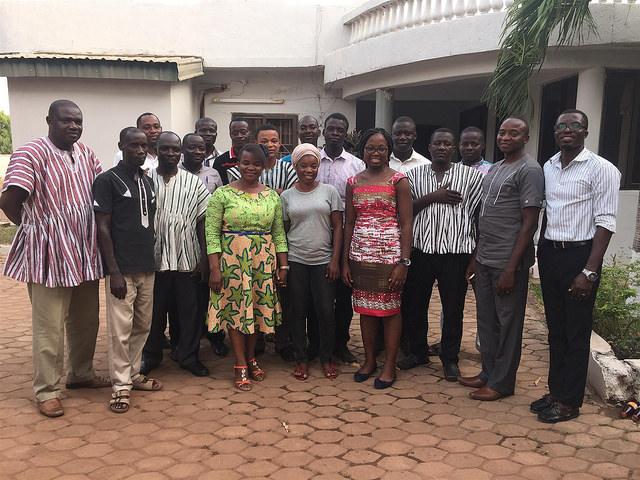
Candidate agCelerantTM franchisees with the trainer (middle), facilitators and Bright S. Freduah of Univ. Ghana. Photo: Mrs. Zenab (ABA G.H.)
A view echoed by local host Dr. Alhassan Abdulai Lansah from Savannah Agricultural Research Institute (CSIR): "this is a laudable initiative; it will safely link farmers to different actors in the value chain for mutual benefit. This is what farmers critically lack today."
For further information, please contact the CASCAID project leader, Pierre Sibiry Traore (ICRISAT), p.s.traore@cgiar.org
Pierre Sibiry Traoré is scientist at ICRISAT and Andrée Nenkam is scientific officer at ICRISAT.

